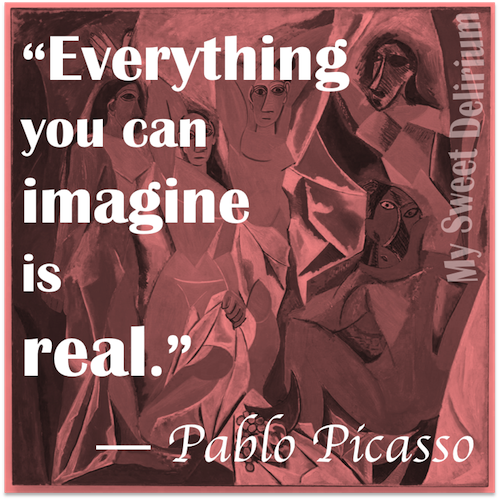How powerful is your imagination?
As I said in a recent post, when I write I feel like I’m channeling a parallel universe. Sometimes I even feel like by imagining the story, I’ve created a new reality.
Whether one believes in string theory, bubble theory, or traditional religion–most humans sense invisible worlds that exist just beyond our perception.
Could these worlds spring into being just by us imagining them? Is our world one such dimension–a thought in another being’s head?
What do you think Picasso meant?


Picasso was being very 16th Century: http://www.renedescartes.com/meditations/rene_descartes_meditations_001.htm
Thanks Paul. I will devour this with my lunch today!
Every thing you can imagine is real, whether it is in your own mind, or it really happened in true life.
Anything can happen in your mind, so it is real because it happened to you.
Picacco had a great imagination and just let it flow, he did not hold back in fear of repercussion of being called a nut, wacko, sicko, etc. which many people did call him, in the same frame he was also called a genius and a true talent. Those that laughed at him did not make millions of dollars on his creative mind that painted. I give him credit for living his life and letting his imagination take him where it wanted to go.
Many creative people hold back because of the fear of being called weird. I have been called that even in my own family, do I care, no way, I enjoy my brain, it amuses me and give me great pleasure, some times it is too demanding, but what the hell.
My husband says he can lock in a closet with an elastic band and I would have fun, haha but so true.
Hats off to Picasso.
Agreed! And just imagine if everyone felt free to explore their creativity and imagination without bounds. What would humanity would come up with? I’m sure we could solve a great deal of obvious problems.
Imagination is to me a piece of our intuition… our subconscious wpeaking out… as it’s proven again and again, our thoughts magnetizes our happenings… what we think will eventually become. I believe this is true in regards to the imagination as well… not in detail, but in the general sense…the meanings behind what we imagine.
I myself have a far too overactive imagination… I am never bored… this is both a blessing and a curse. But it also keeps me eternally thinking and wonrdering and pondering…
That’s the blessing, Charlotta. Never bored.
I used to get bored a lot, and man, am I grouchy when I am bored! But writing seems to work out the imagination muscle, and now I’m usually flooded with simultaneous thoughts and ideas that break off and develop and transform into more ideas. It can be exhausting, but I’m very grateful for this crazy imagination when I’m sitting at a business meeting or suffering through a sleepless night.
What if I imagined that I had three noses? I now have to hope like heck what Picasso said isn’t true. I understand I have created a “real image” in my mind, but since I don’t write or create fantasy, it’s never been something I’ve spent much time considering. This statement is also challenging for me because Picasso says “everything you can imagine is real,” but I am experiencing things I never imagined could be possible. Perhaps I don’t have much of an imagination or maybe I’m the kind of person who hasn’t needed one, since immensely beautiful events just keep rolling out in front of me and all I want to do is find the best way to share them.
Hee-hee, three noses? I think you would do well as a sommelier.
That’s an interesting perspective, but I don’t think he meant it such a literal sense, Ceejae. And he said ‘everything you can imagine is real.’ Written this way, it doesn’t mean it’s a requirement to imagine something before it can become a reality. That would be ‘everything that is real is a product of imagination.’ That phrase would turn this into a theological debate. Maybe reality is already there and what you imagine decorates it. What is going on in your head informs your perception of reality… Or perhaps whatever you have not imagined into reality was imagined by someone else! But let’s not get too crazy here. I’m glad you’re having such beautiful experiences. Unlike those poor souls Filmbell mentioned, we are the lucky ones. I bet if you try to imagine the limitless possibilities for your work (which is excellent, by the way) you would have some fun!
Thank you for the lovely compliment! I’ve always admired people with vivid imaginations and finally accepted the fact that mine struggles, so when you presented this, it struck me as interesting that I don’t use it much, esp. in my writing. I look closely at details and spend a lot of time looking backwards. Surely, there is much more going on than we can imagine, which is part of what makes life so wonderful. And even though I tend to be a realist and my experiences have taught me to not expect too much, I have also learned that I often need to forget everything I’ve been taught! So I will try to do it in the way you suggest, imagining a wonderful future…for my work and yours!
I find it shocking that you feel you don’t use your imagination much when you’re writing. I find your concepts so creative!
I simply try to find the best words I can to describe what’s happening in my life, so of course I consider my work creative, but I think I just define imaginative a little differently. I consider Gene Roddenberry’s work imaginative and Mac Barnett’s work is quite imaginative as well (there’s a delightful TED talk about his work). They envision and create something that has never existed, whereas I work with what is and my efforts are spent on making that as engaging and beautiful as I can within a reasonable time frame.
I’m not as imaginative as those sci-fi and fantasy authors like Tolkien and Roddenberry either. Not yet, at least. My sister has a crazy imagination that can world build and manage every detail. I’m mean minutia. The life history of everyone and their grandparents and great grandparents of just the side characters. She’s amazing. I think her blindness allowed her mind to grow differently. She’s not distracted by the info we must process to see.
On the other hand, I think it takes a strong imagination to make new connections between the inner and outer world, to decipher what our impressions mean and expressing that in words, which you do so well. It’s not always easy to explain what’s going on within us. You must be resourceful to communicate well, and that takes imagination.
He meant, if we may be so bold as to guess, that if your imagination is fully functional, as Pablo’s was, the so-called “line between reality and imagination” has dropped away, the fluids have flowed into a unified perception. Many persons who have fully-functional imaginations are, we suspect, awfully misunderstood. Pablo had his communicative greatness, he was able to let us see his point of view on things. Other imaginations, alas, cannot accomplish this. When some imaginations are truly real, as Picasso’s was, they are instead termed “mad,” because the imagination is where these persons, these vessels containing imagination, truly come to reside. Does this render Pablo’s sentiment a bit imagination-elitist? Maybe, but he took his gifts somewhat for granted, yet bestowed them upon us, so he’s allowed, especially at this late date. We miss Pablo Picasso.
Are the worlds of imagination real? Yes, to many persons, they are, doubtlessly. But, down to brass tacks, it’s far more difficult to declare one’s imagination one’s reality when one is residing, forgotten and at perhaps the edge of starvation, in a prison, or a refugee camp, or just beside some American roadway. Pablo posed a challenge not only to the human spirit, but to our capabilities also. His words can someday become a reality for all, everyone with imagination anyway. That is the someday when all of our brothers and sisters are adequately cared for, when what is “real” to humanity is not merely pain from which one must escape, even if it’s into one’s own mind and spirit.
You’ve just left one of the most beautifully expressed comments in this humble blog’s short history. Thanks so much for taking the time to leave your thoughts.
Imagination-elitist? Love this term! I believe Picasso had every right to be one and we would love him for it.
I appreciate your point about those who are in desperate situations. Many of us are fortunate not to have to resort to imagination as an escape from the ugliness and pain. At worst we might use it to endure a boring conversation or a dull job. This is a luxury we often take for granted.
In fact, many of us suffer because we imagine things far worse than our simple reality. Silly fears become monsters and torment an otherwise benign existence. It can go as far as psychiatric illnesses, where the diseased inner world infects the outer with waking nightmares, when in reality we have everything we need to survive.
I hope one day we all can explore our imagination for enjoyment and not as a coping mechanism used to remove ourselves from the present place and time. Maybe if we all imagine the world where this is the reality, then it will become true.
Am I the only one imagining John Lennon’s voice?
Its says, “Where’s the Vodka? We are about to get the party started.”
There was a Robert Heinlein book where the characters visited other universes only to find most of them were fiction, i.e., they visited OZ (not Australia, the real OZ). I think Picasso was saying the world in the mind has as much validity as the external world, and the imagined is as real as the tangible. I’m with you, my imagined worlds often seem as tangible as the outer one.
Yes, Trent. Validity is a good way to describe it. Not necessarily material, but just as important to our existence.
I’ll have to check out that book. Thanks so much for stopping by. Looking forward to discussing more!
The book is “The Number of the Beast”. In it he (Heinlein) finds a way to have characters from his books over the previous 40 years come together. If you do want to read it you should read (at the minimum) “The Moon is a Harsh Mistress”, the novella “Methuselah’s Children” and “Time Enough for Love” first.
Sounds fascinating. Not my usual reading, so will definitely have to explore.